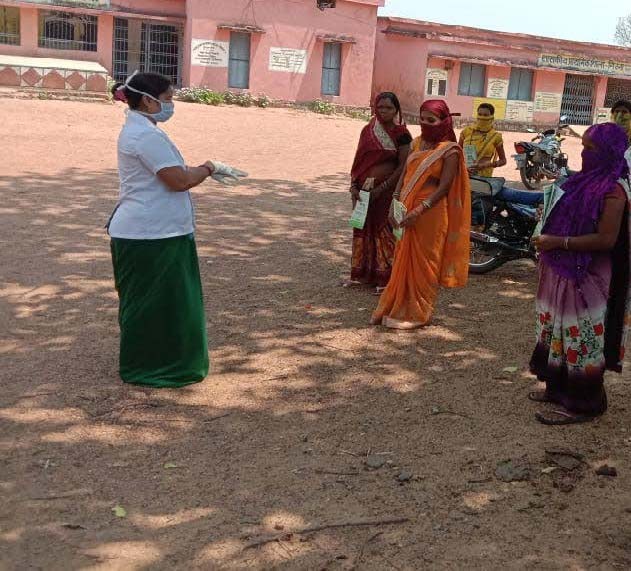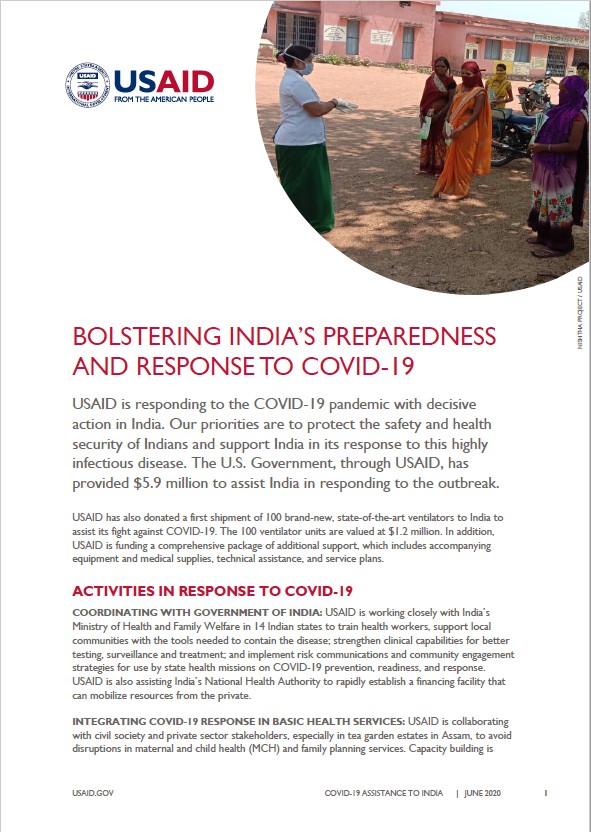India
- History
- Our Work
- Transforming Development Through Innovation & Partnership
- U.S.-India Triangular Cooperation
- Partnership for Energy Access and Security
- Partnership for Sustainable Forests in India
- Partnerships for Health
- Partnership for Education
- Partnership for Water Sanitation and Hygiene (WASH)
- Partnership for Food Security
- Partnership for Gender Equality
- Investing in Afghanistan
- Foreign Assistance Data
- Newsroom
- Newsletters and Fact Sheets
- Speeches
- Resources For Implementing Partners (RFIP)
- Careers
- Partnership Opportunities
- Success Stories
Speeches Shim

USAID is responding to the COVID-19 pandemic with decisive action in India. Our priorities are to protect the safety and health security of Indians and support India in its response to this highly infectious disease. The U.S. Government, through USAID, has provided $5.9 million to assist India in responding to the outbreak.
USAID has also donated a first shipment of 100 brand-new, state-of-the-art ventilators to India to assist its fight against COVID-19. The 100 ventilator units are valued at $1.2 million. In addition, USAID is funding a comprehensive package of additional support, which includes accompanying equipment and medical supplies, technical assistance, and service plans.
ACTIVITIES IN RESPONSE TO COVID-19
COORDINATING WITH GOVERNMENT OF INDIA: USAID is working closely with India’s Ministry of Health and Family Welfare in 14 Indian states to train health workers, support local communities with the tools needed to contain the disease; strengthen clinical capabilities for better testing, surveillance and treatment; and implement risk communications and community engagement strategies for use by state health missions on COVID-19 prevention, readiness, and response. USAID is also assisting India’s National Health Authority to rapidly establish a financing facility that can mobilize resources from the private.
INTEGRATING COVID-19 RESPONSE IN BASIC HEALTH SERVICES: USAID is collaborating with civil society and private sector stakeholders, especially in tea garden estates in Assam, to avoid disruptions in maternal and child health (MCH) and family planning services. Capacity building is being carried out for Command Centre staff and MCH staff to screen, identify and monitor pregnant women, while paying careful attention to pregnant women infected with COVID-19 during pregnancy and throughout the labor/childbirth process. USAID has also developed a module on COVID-19 for the Safe Delivery App, a smartphone application that provides skilled birth attendants with clinical guidelines on basic emergency obstetric and neonatal care.
SUPPORT FOR PEOPLE LIVING WITH HIV AND TB: USAID in collaboration with other U.S. government agencies and the GOI has facilitated shipments of critical drugs from India for more than 65,000 HIV patients across South East Asia. Within India, USAID is working with the National AIDS Control Organization and others to provide patients with three-month drug refills at safe pick-up points and ensure the continuation of routine HIV/AIDS services through telemedicine consultations. USAID is also tapping into its existing networks for TB patients to help them understand the risks from COVID-19 due to their compromised immunity and practice appropriate preventive measures. ASSISTING WOMEN WITH DISABILITIES: USAID is working to mitigate COVID-19 related challenges faced by women with disabilities by setting up telephone networks to communicate critical pandemic information, assess their needs, and provide COVID-19 mental health counselling; developing a video on COVID-19 for deaf residents, and is advocating for the unique needs of this group.
ENGAGING WITH PRIVATE SECTOR AND OTHER STAKEHOLDERS: USAID is disseminating COVID-19 information to more than 100 U.S. and Indian corporations to use with their employees and communities. These companies are part of the “Corporate Tuberculosis Pledge,” a joint initiative of USAID and the Ministry of Health and Family Welfare to engage the private sector in the country’s fight to end TB. In addition, USAID and India’s largest public sector bank – the State Bank of India (SBI) – are working together to leverage financial resources to support healthcare facilities, civil society organizations, and research and academic institutions involved in developing and scaling innovations around COVID-19 prevention, diagnostics, and treatment.
ASSISTING TIBETANS LIVING IN INDIA AND NEPAL: USAID and its partners have launched various activities to prevent the spread of infection and cross-infection in Tibetan settlements. USAID is distributing preventive and protective supplies to all 44 USAID-supported health facilities in India and Nepal including distributing posters, pamphlets and banners with health messages in English and Tibetan languages. In addition, USAID will reimburse emergency ambulance fares to transport patients in critical condition to nearby Indian hospitals.
INTEGRATING COVID RESPONSE IN WATER AND SANITATION ACTIVITIES: USAID, as one of the leading partners of the Government of India (GOI) on the Swachh Bharat Mission (Clean India Campaign), have produced a report on the “Potential Impact of COVID-19 on the Indian Sanitation Ecosystem” that recommends several short- and long-term steps ahead to reduce the impact on the sector. In addition, USAID and its implementing partners developed various resources and tools to promote safe water and sanitation practices in Gujarat, Rajasthan and Odisha. Select city administrations in these states are now widely using these tools in their COVID-19 response.
ENSURING A ROBUST, RESILIENT POWER SECTOR POST COVID-19: USAID, through multiple initiatives, is assisting the Government of India and others countries in South Asia to mitigate operational challenges in the grid, such as the demand-supply variations seen during the COVID-19 situation. USAID has prepared detailed studies to analyze the impact of COVID on power demand and supply in the South Asian countries and its impact on power trade and power market, and is supporting India’s national system operator with tools to balance supply and demand for energy in real-time through pilots at its hydro and solar units and through flexible operations of coal plants. Detailed policy recommendations for each country in South Asia to manage the impact of COVID on its energy sector is also being developed.
HOW YOU CAN HELP
The most effective way people can assist relief efforts is by making cash contributions to organizations that are conducting relief operations. USAID encourages cash donations because they allow aid professionals to procure the exact items needed; can be transferred quickly and without transportation costs; support the economy of the disaster-stricken region; and ensure culturally, dietarily, and environmentally appropriate assistance.
For more information and to donate, visit USAID’s Center for International Disaster Information: www.cidi.org.
USAID has established an inbox (covid19tf_pse@usaid.gov) to coordinate private sector engagement around the COVID-19 response.
USAID can accept unsolicited applications and proposals. The Agency has set up a COVID-19 Concepts portal at: https://www.usaid.gov/coronavirus/funding-requests-unsolicited-proposals.
For more information, please visit www.usaid.gov/coronavirus


Comment
Make a general inquiry or suggest an improvement.